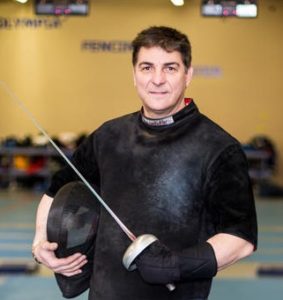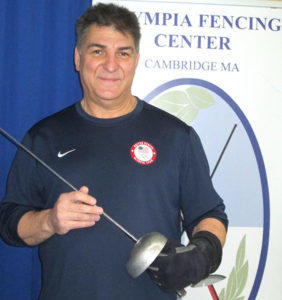By Peg Lopata, Contributing Writer

Cambridge – What do you think of when you imagine people fencing? A scene from a play by Shakespeare? Aristocrats dueling on an endless lawn of the manor of a duke? Once it was the sport of kings, but swordplay is even older: there are carvings depicting fencers from around 1190 BC. But in modern times, one little boy discovered this sport in a very modern way: by watching a movie. The movie, of course, was The Three Musketeers. Romanian seven-year-old, Daniel Hondor said to his mother right after he saw the movie: “I want to be a fencer!”
Hondor’s story begins in Romania in 1966 some 70 years after fencing was first played at an Olympics. According to Hondor, his hometown of Craiova was considered Romania’s fencing capital. When he was growing up fencing was offered for free as an after-school activity. So perhaps it wasn’t just those musketeers that spiked Hondor’s interest in this sport propelling him to become a national champion.
The path to champion began when Hondor left home at age 14 to train and compete, traveling all over the world for competitions. By his teenage years, he became a member of the Romanian National Épée Team, multiple times winner of Balkan Athletics Championships (a fencing championship very popular in Europe) and finalist in numerous World Cup Competitions during the 80s.
He received a bachelor’s degree in physical education from the University of Physical Education and Sport in Bucharest and became a coach for the Romanian girls’ national team. But political upheaval roiled his country in conflict so after his trip to the 1996 Olympic Games in Atlanta, GA, he didn’t go home. Leaving his country wasn’t difficult.
“Because of all the training camps, fencing competitions and traveling,” explained Hondor, “I was used to being on my own.”
Like many immigrants arriving here Hondor waited tables to get by. Then he ran his own restaurant, followed by a fulltime position as a fencing coach. Assimilation came easy.
“I am someone who quickly adapts,” he said.

In 2012, he founded the Olympia Fencing Center in Cambridge. According to Hondor, his training center is one of the largest and most successful fencing clubs in the U.S. He’ll be opening up another training center, this one in Newton, soon. Clearly, he followed his father’s advice: Don’t chase the money. Do instead what you love, with passion and dedication. Follow your dreams, work hard, don’t give up. You’ll be happy and the money will follow.
“I owe it all to him,” said Hondor. “I do what I love, I love what I do. I love this sport. I even like the smell of sweat and iron on my jacket and on my mask.”
Fencing is Hondor’s legacy.
“I want to leave something behind. I want to make a difference,” he explains. Of his three children and two grandchildren—one child is a fencer in the NCAA and a granddaughter has just started fencing. Then there’s the countless students he’s had, his “other children”, as he calls them.
“I am proud to say that I have watched a few great generations growing up and becoming adults and now I am getting ready for the weddings!”
“I tell parents that through fencing their kids will learn to face their fears and make decisions alone without asking mom or dad. They learn from their mistakes.,” he noted. “They learn to lose. For adults it teaches you about yourself in a way that you would not be able to see otherwise. It’s safe, it’s fun—you break a sweat while having fun—you burn over 600 calories an hour. It keeps you active and healthy.”
Learn more about Hondor and his club click here.
Photos/submitted












